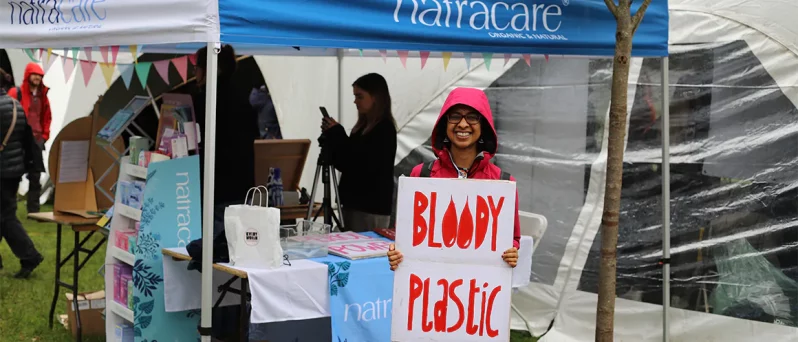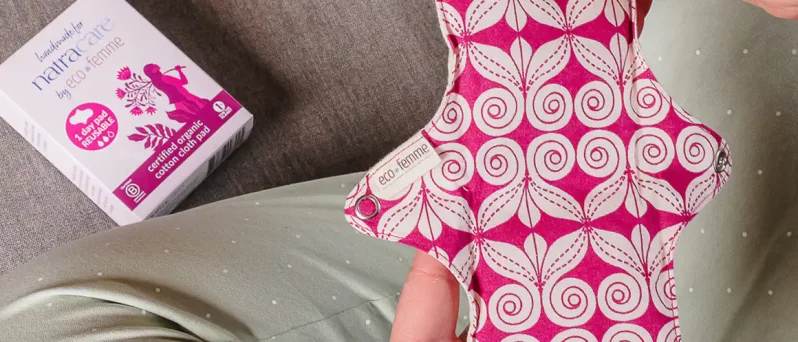New data shows that 1 in 4 people suffer skin reactions when using perfumed period products, although the number is likely to be much higher as many people are unaware that their symptoms are linked with their choice of period protection.
Women, girls and people who menstruate have experienced burning, itching and irritation from scented pads and liners, and 28% of those surveyed claimed the problem was “very or fairly severe.”
“As soon as I use a sanitary pad I itch, swell, skin peels off and burns,” says Evie from Cambridge, “I ended up getting the contraceptive injection just to avoid having to use pads again.”
Raising concern about perfumed period products, consultant gynaecologist Dr Leila Frodsham highlights “It’s really important to make sure we aren’t changing that vulval and vaginal flora that can make us much more likely to get bacterial vaginosis and candida; once that takes hold, your skin breaks slightly and that’s when you start to get real problems.”
Even for those not experiencing aggressive symptoms, perfumed products might be causing problems. Synthetic fragrances can be made from a cocktail of up to 3,900 chemicals including hormone-disruptors and chemicals linked to cancer. The sensitive skin of the vagina can rapidly absorb harmful chemicals and circulate them through the rest of the body, posing question marks for the safety of these ingredients.
Why do people buy scented pads and liners?
The study looks into reasons why women, girls and people who menstruate might be choosing perfumed products. Only 1 in 10 people actually like the smell of the scented pads and liners, whereas 15% of 18-24 year olds claimed they felt pressured to conceal the smell of their periods. This same age group were the ones most targeted by social media adverts for fragranced intimate products.
Worryingly, 23% of respondents said that they chose scented products because nothing else was available on the shelves. This matches up with research of supermarket shelves, which shows a staggering 49% of panty liners on supermarket shelves contain perfumes, and 33% of period pads contain perfumes. Availability of plastic free and perfume free alternatives was relatively poor, with Asda and Morrisons offering the least.
Lobbying for change
The new findings are part of a “Period NonScents” project launched during Environmenstrual Week 2021 (11-17th October) by Wen (Women’s Environmental Network) and period brand Natracare. The report uses fresh data and expert insights to reveal the impacts and attitudes towards hidden ingredients in perfumed period products.
Natracare and Wen hope to bring about increased transparency and regulation in the menstrual products industry through awareness raising and lobbying.
“It’s immoral that people are purchasing products with so little knowledge of what’s inside,” says Jessica Gitsham from Natracare, “It’s the responsibility of the government to put in place some basic legislation that regulates what goes inside period products, and brands must be more transparent. 85% of people we surveyed wanted to see full ingredients lists. Currently brands are using confusing language such as ‘odour control’ and perpetuating the idea that periods need to be masked in some way.”
Helen Lynn from Wen comments: “Recent regulation from New York State has paved the way for greater transparency about what is in our period products. It’s astonishing the amount of residues which have been found in these products along with intentionally added fragrances and the use of ‘odour control technologies’. If the levels of fragranced chemicals used in period products were found in cosmetics products, they would require mandatory labelling. There is an urgent need for action by the government to regulate period products and ensure greater transparency from the period products manufacturers.”
What can individuals do?
➢ Sign and share the Period NonScents petition, calling on governments and brands to regulate and transparently communicate the ingredients in period products.
➢ Tweet period product brands and let them know you want transparency of ingredients.
➢ Share stories of skin reactions on social media, using the hashtag #PeriodNonScents and tag the offending product.
➢ Watch, like and share this reaction video showing genuine responses to old adverts for scented intimate care products – the misogyny and stigma is enough to leave you fuming!
Notes to editors
Natracare is the first company in the world to provide plastic-free, certified organic cotton tampons and totally chlorine-free sanitary pads and panty liners. Natracare products are biodegradable and can even be composted. Susie Hewson created the brand in 1989 in response to the growing danger to human health and the environment from dioxin pollution in the pulping industries with the chlorine bleaching of paper products.
Wen is the Women’s Environmental Network, a charity founded in 1988 to offer a feminist perspective on environmental issues. Campaigns and programme areas include Environmenstrual, toxic free living, food security and a UK Feminist Green New Deal. Wen’s Environmenstrual Campaign raises awareness of hidden plastic and harmful chemicals in conventional period products and promotes reusable and organic options. Wen convenes Environmenstrual Week, which runs every October, the Environmenstrual Coalition, which has over 60 members and a period education programme, training Environmenstrual Ambassadors across the UK.








